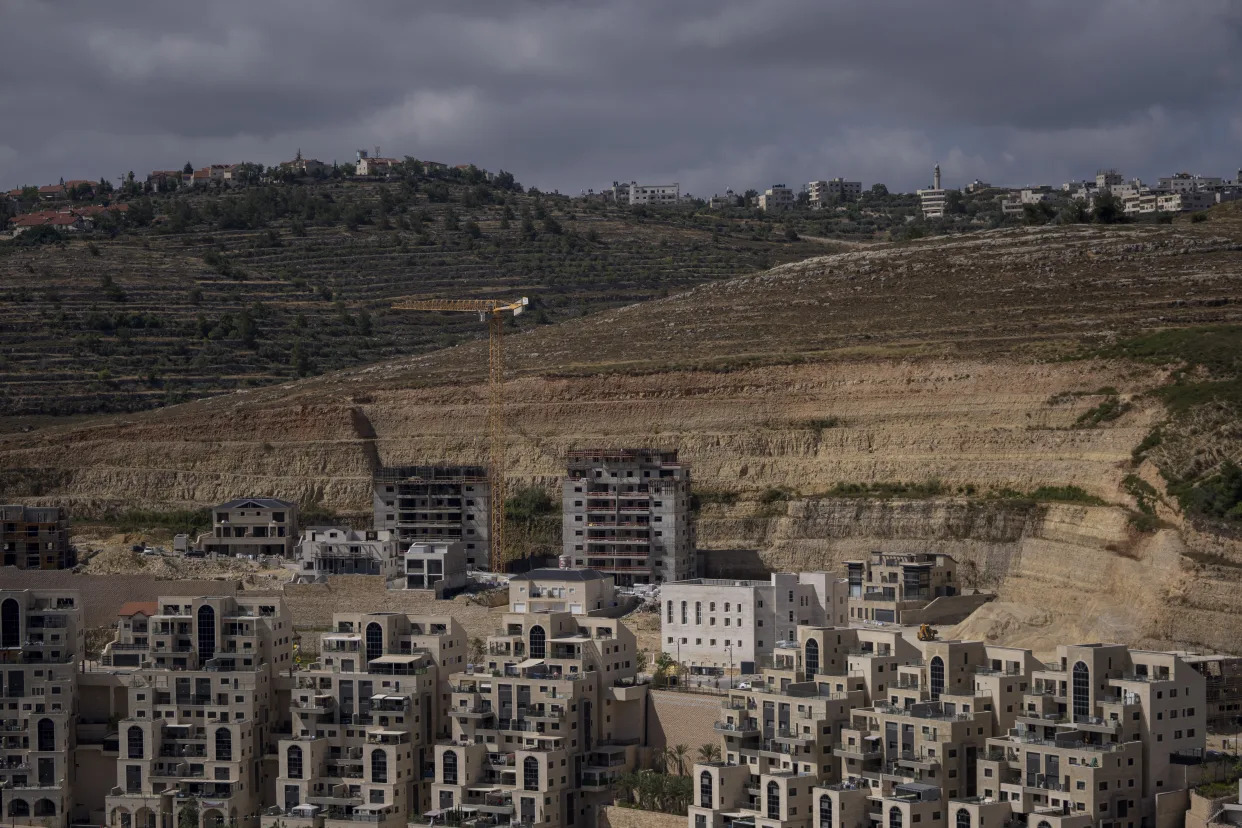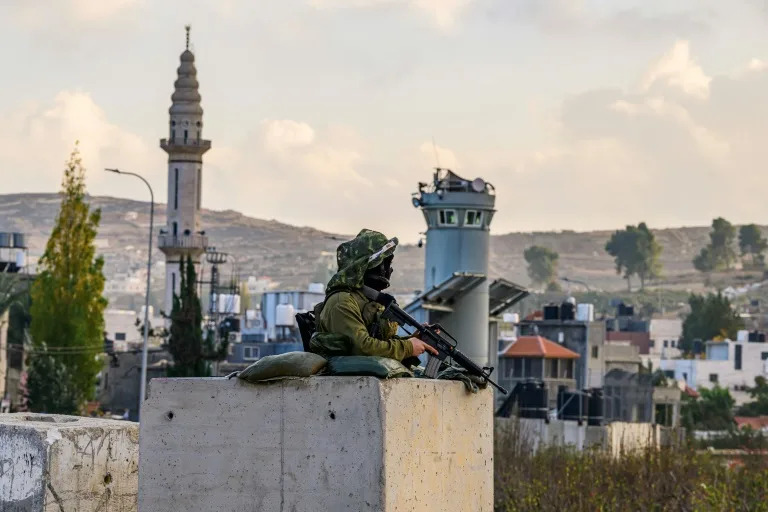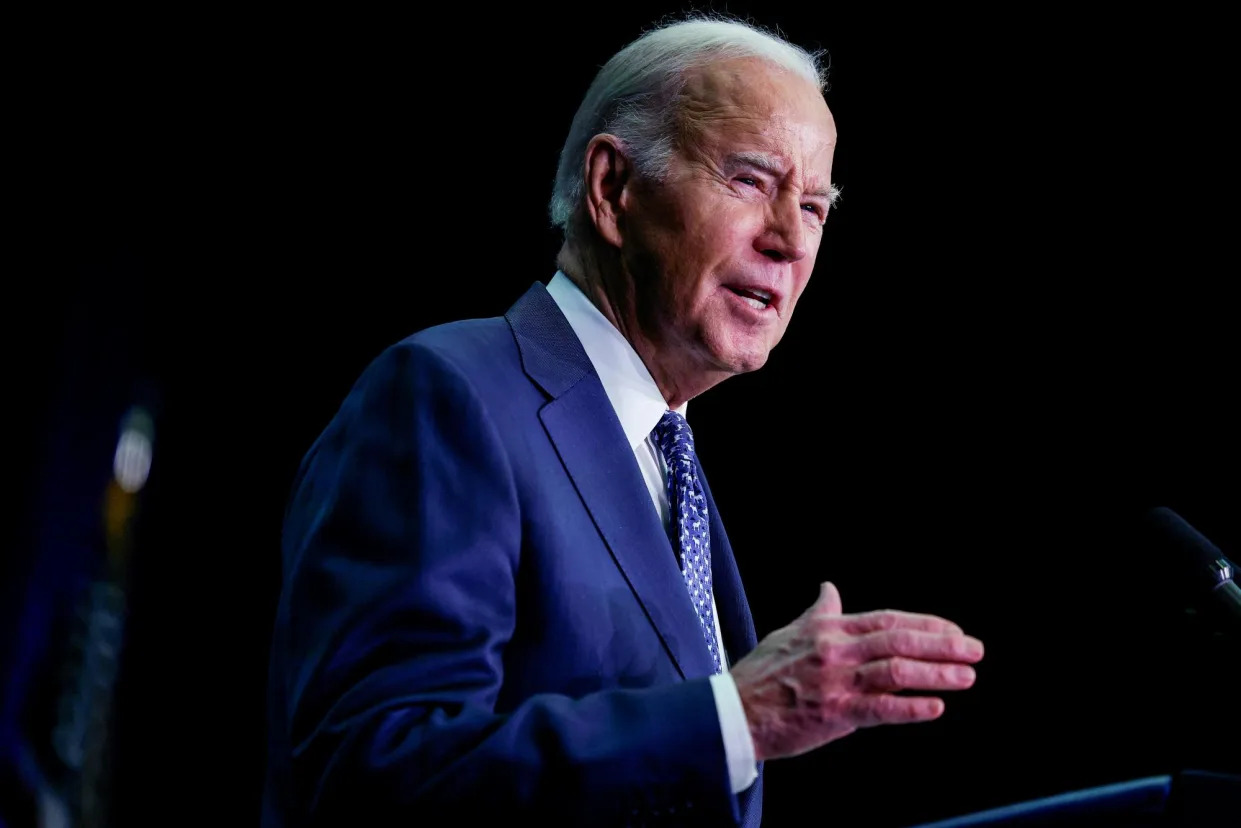Adam Schrader
Sun, February 11, 2024

A displaced Palestinian woman sits in front of a makeshift tent with her children, as Palestinian families seek shelter in the Mawasi area as they struggle to find clean water, food and medicine as Israeli attacks continue in Rafah, Gaza, Saturday, February 10, 2024. Photo by Ismael Mohamad/UPI
Feb. 11 (UPI) -- Illegal Israeli settlers threw stones at Palestinians in their cars in the West Bank on Sunday, before tear-gassing drivers, according to an Israeli human rights group.
The news was reported by Al-Jazeera citing Yesh Din, a non-governmental organization based in Israel. The organization has been tracking incidents of violence committed by Israeli settlers illegally living in the West Bank against Palestinians.
"The Israel government is coming out against the U.S. imposing sanctions on violent settlers but continues to do nothing to stop West Bank settler violence," Yesh Din said in a post on social media last week.
The organization has also been calling for a cease-fire in Gaza, while noting that only 6.6% of all criminal investigations opened by Israel against Palestinians they have detained have led to a conviction. And less than 1% of complaints against Israeli soldiers led to indictments.
Earlier this month, Joe Biden targeted violent settlers in the West Bank with sanctions -- a surprise move considering the president's long historical ties to Israel.
"[The violence] has reached intolerable levels and constitutes a serious threat to the peace, security and stability of the West Bank and Gaza, Israel and the broader Middle East region," Biden said.
"These actions undermine the foreign policy objectives of the United States, including the viability of a two-state solution and ensuring Israelis Palestinians can attain equal measures of security, prosperity and freedom."
But critics have said the sanctions, which only named a handful of people, don't go far enough as Palestinians point to the hundreds of people killed by Israelis before Hamas attacked on October 7. In 2023 alone, 199 Palestinians living in the West Bank were killed up through October 6.
Israel's West Bank settler population grew nearly 3%. Supporters say Gaza war could give new push
JULIA FRANKEL
Sun, February 11, 2024

This photo shows a construction site of new housing projects in the West Bank Israeli settlement of Givat Ze'ev, Monday, June 18, 2023. The population of Israeli settlers in the occupied West Bank grew nearly 3% in 2023, according to a new report based on population statistics from the Israeli government. The report, released Sunday Feb. 11, 2024 by the pro-settler group WestBankJewishPopulationStats.com, found the settler population jumped to 517,407 as of Dec. 31, from 502,991 a year earlier. (AP Photo/Ohad Zwigenberg, File)More
JERUSALEM (AP) — The population of Israeli settlers in the occupied West Bank grew nearly 3% in 2023, according to a new report based on population statistics from the Israeli government.
The report, released Sunday by the pro-settler group WestBankJewishPopulationStats.com, found the settler population jumped to 517,407 as of Dec. 31, from 502,991 a year earlier.
The settler population has grown over 15% in the last five years, the report said. Last year, it passed the half-million mark, a major threshold.
This year’s report predicted “accelerated growth” in the coming years, claiming the Oct. 7 Hamas attack on southern Israel, which triggered the current war in Gaza, persuaded many Israelis who were formerly opposed to settlement-building on occupied land to change positions.
“Serious cracks have indeed developed in the wall of opposition to Jewish settlement of the West Bank,” it said.
Israel captured the West Bank, east Jerusalem and Gaza Strip in the 1967 Mideast war. The Palestinians seek all three areas for an independent state.
The international community overwhelmingly considers Israel’s settlements to be illegal and obstacles to peace by occupying land the Palestinians seek for their state. Israel considers the West Bank to be “disputed” and says the territory’s fate should be decided in negotiations. The Biden administration recently sanctioned four settlers for violence against Palestinians and activists in the West Bank.
The report projected that if the growth rate over the past five years continues, the settler population in the West Bank will exceed 600,000 before 2030.
The report did not include population figures for east Jerusalem, where more than 200,000 Israelis live in settlements that Israel considers to be neighborhoods of its capital. The Palestinians claim east Jerusalem as their would-be capital.
Israel’s government is dominated by settler leaders and supporters. The Israeli watchdog group Terrestrial Jerusalem says that since the start of Israel’s war in Gaza on Oct. 7, three settlement plans were either approved or are about to be approved in east Jerusalem.
Terrestrial Jerusalem called the speed of settlement approval processes over the last few months “frenetic."
The report comes as a spasm of violence grips the West Bank.
Since the Hamas attack on Oct. 7, Israel has held the West Bank under a tight grip — limiting movement and conducting frequent raids on what it says are militant targets.
Palestinian health officials say 391 Palestinians have been killed by Israeli fire in the West Bank during that period. Most have been killed in clashes with Israeli forces. But the Israeli rights group Yesh Din says settlers shot and killed nine Palestinians in just the first month and a half of the war, among 225 incidents of Israeli civilian violence the group documented during that time.
Hossam Ezzedine with Majeda El-Batsh in Jerusalem
Fri, February 9, 2024

An Israeli soldier mans a checkpoint at the al-Aroub camp for Palestinian refugees south of Bethlehem in the occupied West Bank (John MACDOUGALL)
To arrive at work in Jerusalem on time, Murad Khalid must be at the Israeli checkpoint by 3:00 am, despite living nearby in the occupied West Bank -- a constant challenge made worse by the Gaza war.
The 27-year-old said he and other residents of Kafr Aqab neighbourhood in Israeli-annexed east Jerusalem -- located on the West Bank side of the barrier -- are subjected to a "security check that may take an hour for each car" at Qalandia crossing.
Israeli movement restrictions have long made life difficult for the three million Palestinians living in the West Bank.
But since the outbreak of the Israel-Hamas war, traffic has become "paralysed", said Palestinian Authority official Abdullah Abu Rahmah.
The number of checkpoints and barriers in the Palestinian territory has greatly increased since October 7, adding hours to already lengthy commutes and forcing residents to either wait at the checkpoints or take long detours.
Largely unaffected are the 490,000 Israelis living across the West Bank in settlements -- considered illegal under international law -- who can bypass Palestinian communities on roads built especially for them.
- 'Exhausting' -
It used to take accountant Amer al-Salameen just half an hour to drive from his home in the city of Ramallah to his parent's village Al-Samou.
But with the new restrictions, the journey has turned into an "exhausting, tiring, and uncomfortable" four hours, said the 47-year-old.
"I used to visit my family every weekend with my wife and children. But today, I fear that something might happen on the road."
Israel, which has occupied the West Bank since 1967, has stepped up raids into Palestinian communities since Hamas's October 7 attack, which resulted in the deaths of more than 1,160 people in Israel, mostly civilians, according to an AFP tally based on official figures.
Israel vowed to eliminate Hamas and launched a relentless military offensive that has killed at least 27,947 people in Gaza, most of them women and children, according to the Hamas-run territory's health ministry.
In the West Bank, more than 380 Palestinians have been killed by Israeli troops and settlers over the same period, according to the Ramallah-based Palestinian health ministry.
Scores more have been arrested.
- 'Security for all' -
The Israeli army told AFP the additional barriers are "in accordance with the assessment of the situation in order to provide security to all residents of the sector".
Recently, an AFP team leaving Jerusalem at 8:00 am for the northern West Bank city of Tulkarem -- normally a trip of just two hours -- arrived there at 1:30 pm, following dirt roads through villages to get around the barriers.
The journey from Jerusalem to Jenin, also in the north, now similarly takes five hours instead of two.
Immediately after the October 7 attack, the Israeli army shut the road between the town of Huwara and Nablus, a major northern Palestinian city.
According to an AFP photographer, the army has also closed off the main entrances to most villages around Hebron in the southern West Bank, forcing residents to take dirt roads through other villages to access cities.
Student Lynn Ahmed says her usual one-hour drive from Tulkarem to Birzeit University, north of Ramallah, now takes more than three "due to closures and the destruction of some roads."
Given such difficulties, Birzeit and other Palestinian universities in the West Bank have returned to remote learning.
Israel first erected military checkpoints in the West Bank following the first Palestinian uprising or intifada in 1987, but the number increased after the start of the second intifada in 2000.
Since then, earthen barriers, gates, or cement block around 700 roads across the West Bank, according to the Palestinian Authority's Abu Rahmah, who heads a team monitoring settler activity.
he-mab/ysm/jd/spm
Chris McGreal in New York
Sat, February 10, 2024

Joe Biden speaks in Leesburg, Virginia, on 8 February.Photograph: Evelyn Hockstein/Reuters
There are growing calls for Joe Biden to use his new executive order sanctioning violent Israeli settlers to also target political leaders, including government ministers, responsible for driving attacks against Palestinians.
Pro-Israel groups and others in the US say the order is potentially a severe blow to the settlement movement in the West Bank, in part because financial sanctions could block even Israeli banks from doing business in parts of the occupied territories.
Human rights groups also want to see the measures used to stop US groups from donating tens of millions of dollars each year to the settlers.
The Biden administration has not said how widely it will apply the order after initially imposing sanctions against just four settlers responsible for escalating attacks on Palestinians, including forcing entire villages from their homes.
Josh Paul, a former state department official who resigned over the US supplying weapons for Israel’s present war in Gaza, said that the order is framed broadly enough for the administration to pursue those enabling and facilitating a surge in killings, beatings and forced removals. It is driven in part by far-right members of the government, such as the national security minister Itamar Ben-Gvir, intent on removing Palestinians as a step toward annexation of all or parts of the occupied territories.
“I think the order could and should implicate members of the current Israeli government, including Ben-Gvir but not only,” said Paul.
“The order is a small step forward and incremental one. On the one hand, I would say it certainly doesn’t go far enough. But also it does have the potential to be used a lot more than it has been so far.”
Michael Schaeffer Omer-Man, research director for Israel-Palestine at the group founded by the assassinated Saudi writer Jamal Khashoggi, Democracy for the Arab World Now, said that if the sanctions were expansively applied they could have a significant impact.
“The potential is to completely defund the settlement movement and the organisations that support it. It’s a very broad, powerful, weapon. But we have to see how they use it,” he said.
Paul suspects the order is a warning shot to pressure the Israeli government to rein in the settlers, who often act under the protection of the Israeli military or police, out of concern that the violence could explode into full scale conflict in the West Bank. But he questions whether Biden is interested in addressing the wider issue of the settlements, and the 700,000 Israelis living in the occupied territories, as an obstacle to peace.
“The problem isn’t violent settlers. They’re low-hanging fruit. The problem is the settlement enterprise and that is an enterprise that is funded, supported, enabled through US private donations and through US government tacit support. Occasionally secretaries of state or presidents pop up to condemn new settlement announcements but then do absolutely nothing to get in the way of that construction happening,” he said.
Others see the order as a chance to change the face of the settlement movement.
T’ruah, a New York-based group of rabbis campaigning for human rights, welcomed Biden’s order as “a really positive first step that has a lot of potential”. But T’ruah’s director, Rabbi Jill Jacobs, said the White House should follow up by targeting “the real leaders of the violent settler movement, including the heads of organisations that are inciting this violence”.
“There are a number of settler organisations in Israel whose leadership has been indicted, even in some cases convicted, in Israel of incitement and terror. The next step is to look at the leaders of those organisations,” she said.
Jacobs said that included much more prominent figures than the four obscure settlers already sanctioned, including present and former members of the Israeli parliament. She said Biden’s order should also be used to stop American organisations funding extremist Jewish groups in the occupied territories, including some with with close ties to the Kach movement, founded by the extremist American-born rabbi Meir Kahane and banned in Israel as a terrorist group.
“They’re also funding yeshivas like Od Yosef Chai in Yitzhar, one of the most extreme settlements. There are often settler attacks that originate from that settlement incited by the rabbis at the yeshiva,” she said.
In a rare prosecution of a rabbi, Yosef Elitzur of Yitzhar was convicted three years ago of inciting violence against Palestinians. Another of the yeshiva’s rabbis wrote a book claiming religious law permits Jews to kill gentile babies because of “the future danger that will arise if they are allowed to grow into evil people like their parents”.
In 2015, the Israeli newspaper Haaretz revealed that at least 50 organisations across the US were involved in fundraising for Israeli settlements.
T’ruah has previously asked the US tax authorities to investigate several American groups it accuses of funding Lehava, the Yitzhar yeshiva and other settlements with a history of violence or extremist groups. These include the New York-based Central Fund of Israel which also helps finance the Israel Land Fund which responsible for the expulsion of Palestinian families from their homes to make way for Jewish settlers.
Jacobs said money raised in the US also goes to Honenu, a group associated with Ben-Gvir, that gives cash payments to Israelis convicted of terrorism, including Yigal Amir, who assassinated the prime minister Yitzhak Rabin in 1995.
Another US group, Friends of Ir David, funds Elad, an Israeli settler organisation responsible for the forced removal of Palestinians as it seeks to “Judaise” occupied East Jerusalem.
Biden’s order bars individuals from travelling to the US and freezes their assets there. It quickly became evident that the measures could have a significant effect on settlers who have no direct connection with the US after Israeli banks froze accounts belonging to the targeted individuals so as to comply with American law.
Omer-Man said imposing sanctions on a wide range of settler leaders and those who support them could have a real impact.
“Take somebody living in a settlement. They have a mortgage. If they’re on the sanctions list, what happens to the mortgage? Does the Israeli bank cancel it? Does the Israeli government create a bank just to give mortgages to settlers which is then itself open to sanctions. The Jewish National Fund and the World Zionist Organization are involved designating and giving land to settlers which is inherently a part of the system,” he said.
“But none of that happens without political will. We don’t know what the red lines are, the triggers that the administration has set internally for when they’re going to expand the sanctions. If they don’t at least come up with a second round, then they won’t have created deterrence. It seems ridiculous to sanction these four individuals who are nobodies but it’s not really targeting them. It’s targeting the Israeli government.”
Paul said the Biden administration is genuinely concerned at events in the West Bank.
“I think the Biden administration understands the immense and imminent risk of a collapse of the Palestinian Authority in the West Bank, which would be an absolute catastrophe,” he said.
But Paul added that the sanctions order was also a domestic political move, arriving in the face of strong criticism from Arab American voters and many more liberal Democrats over Biden’s support for Israel attack on Gaza even as the Palestinian death toll rose into the tens of thousands.
“I had a conversation a couple of days ago with an Arab American activist who told me that the settler sanctions were announced they got 50 texts from the administration saying, ‘Look at what we’re doing, isn’t this great?’ So it goes to show that there is inherently a political aspect to this,” said Paul.
No comments:
Post a Comment